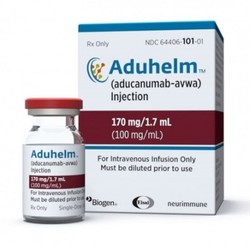Experts from the Institute for Clinical and Economic Review (ICER), a U.S. non-profit organization, say Biogen's Alzheimer's disease treatment, Aduhelm (ingredient: aducanumab), is not cost-effective, putting a brake on its advance to the U.S. market.

At a meeting last Thursday, the ICER experts reviewed the cost and clinical trial results of Aduhelm set by Biogen. All 15 participants unanimously voted that Aduhelm does not provide more benefits to patients, doctors, and society than the current standard treatment.
The experts pointed out that while one of the later clinical trials submitted for approval showed that Aduhelm had some benefit in slowing disease progression, a different study contradicted such results. The expert group also took issue with the frequent reports of adverse events concerning amyloid-related imaging abnormalities (ARIA).
Biogen recently set the annual treatment cost of Aduhelm at $56,000 after the U.S. Food and Drug Administration (FDA) approved the treatment. However, the treatment cost does not include the price of a positron emission tomography (PET) scan or magnetic resonance imaging (MRI) for diagnosing Alzheimer's disease. Including these collateral costs, the figure soars up to about $100,000 a year.
"The price of Aduhelm set by Biogen does not reasonably match the clinical benefit," the ICER said in late June, pointing out that Biogen needs to lower the drug price by 85-95 percent from the current list price to meet a reasonable price tag.
At that time, ICER's estimated that the cost-effectiveness of Aduhelm ranges from a minimum of $3,000 to a maximum of $8,400, which is far lower than the price set by Biogen.
In response, Biogen's Chief Medical Officer Maha Radhakrishnan criticized the ICER, saying that evaluating drugs requires innovative thinking and a new framework for assessing potential value.
"We regret that ICER assessment missed this point," Radhakrishnan said.
However, ICER reconvened the experts’ meeting and presented opinions that the price set by Biogen for Aduhelm does not provide any benefits compared to existing treatments, which will likely have negative effects on the discussion of Medicare application to the drug that starts next week, industry insiders predicted.
Medicare is a health insurance system for the elderly in the United States. The federal government subsidizes 50 percent of medical expenses for seniors 65 years of age or older and people with disabilities who have paid social security tax for 20 years or more.
Currently, some major hospitals are refusing to prescribe Aduhelm until the drug receives coverage by Medicare, and private insurance companies are also delaying coverage plans.
Meanwhile, the FDA significantly reduced the number of treatment targets by inserting and updating the label for Aduhelm and restricted the drug use for "patients with mild cognitive impairment or mild dementia stage of the disease" on July 8.
In the updated label, the FDA added that Aduhelm treatment should only treat patients with mild cognitive impairment or mild dementia, as Biogen's trial only used the therapy in such patients, and that there are no safety or efficacy data for use at earlier or later stages than those studied.

